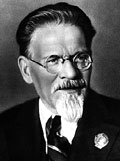| A revolutionary of peasant origin, Mikhail Kalinin joined the Russian Social-Democratic Workers' Party in 1898, and became one of the first supporters of Bolshevik faction. He played an active role in the party's revolutionary functions and participated in the Russian Revolution of 1905 in St. Petersburg. In 1912 he became a candidate member of the Bolsheviks' Central Committee, a member of their Russian bureau, and cofounder of their newspaper Pravda. After the Bolshevik coup d'état (November 1917), he served as mayor of Petrograd. In December 1917, Kalinin entered the board of the RSFSR People's Commissariat for Food Supplies. On 30 Mar 1919, he was elected chairman of the All-Russian Central Executive Committee of Soviets (30 Mar 1919 - 15 Jul 1938). The party's Central Committee elected Kalinin candidate member of the Politburo (25 Mar 1919 - 18 Dec 1925) and full member (29 Nov 1919 - 29 Mar 1920) of the Orgburo in 1919, but he was not re-elected to this body after the 9th party congress. In 1921, he was made candidate member of the Orgburo (16 Mar 1921 - 2 Jun 1924) and later was again promoted to full membership (2 Jun 1924 - 18 Dec 1925). The first session of the Central Executive Committee of the USSR elected Kalinin, who represented the Russian Socialist Federated Soviet Republic, one of the four chairmen on 30 Dec 1922. He was re-elected chairman of the Central Executive Committee on six occasions until his term expired at the time of inaugurating the new Soviet parliament, Supreme Soviet, in 1938. On 17 Jan 1938, the joint meeting of two chambers of the Supreme Soviet elected Kalinin chairman, a post equal to that of head of the Soviet state. Accession of Kalinin to the top leadership of the Communist party was made complete, when he was elected full member (1 Jan 1926 - 3 Jun 1946) of the Politburo after the 14th party congress. Despite the fact that he exposed some favor of right wing trend in the disputes within the party in the 1920s, Kalinin always supported Iosif Stalin and survived political purges. He retained his high government office until he tendered his resignation to the Supreme Soviet on 19 Mar 1946, shortly before his death. Biography source: [4]
|

